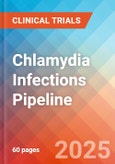Chlamydia Infections Understanding
Chlamydia Infections: Overview
Chlamydial infection, caused by Chlamydia species, is the most common bacterial sexually transmitted infection and results in substantial morbidity and economic cost worldwide. Chlamydial infections can cause disease in many organ systems, including the genitourinary tract and ocular structures. Chlamydia is a sexually transmitted infectious disease caused by the bacterium Chlamydia trachomatis. Globally, it is the most common sexually transmitted infection. Chlamydia infections include urogenital tracts in males and females (STIs), pneumonia (lung infections), and ocular infections.'Chlamydia Infections - Pipeline Insight, 2025' report outlays comprehensive insights of present scenario and growth prospects across the indication. A detailed picture of the Chlamydia Infections pipeline landscape is provided which includes the disease overview and Chlamydia Infections treatment guidelines. The assessment part of the report embraces, in depth Chlamydia Infections commercial assessment and clinical assessment of the pipeline products under development. In the report, detailed description of the drug is given which includes mechanism of action of the drug, clinical studies, NDA approvals (if any), and product development activities comprising the technology, Chlamydia Infections collaborations, licensing, mergers and acquisition, funding, designations and other product related details.
Report Highlights
The companies and academics are working to assess challenges and seek opportunities that could influence Chlamydia Infections R&D. The therapies under development are focused on novel approaches to treat/improve Chlamydia Infections.Chlamydia Infections Emerging Drugs Chapters
This segment of the Chlamydia Infections report encloses its detailed analysis of various drugs in different stages of clinical development, including phase II, I, preclinical and Discovery. It also helps to understand clinical trial details, expressive pharmacological action, agreements and collaborations, and the latest news and press releases.Chlamydia Infections Emerging Drugs
EVO100: Evofem Biosciences
EVO100 is an investigational candidate for the prevention of urogenital chlamydia and gonorrhea in women. The investigational drug candidate EVO100 vaginal gel is designed to reduce certain vaginal infections by: 1)Balancing vaginal pH, thereby maintaining healthy vaginal flora and creating an environment that is detrimental to the growth and proliferation of harmful bacteria. 2) Using a different mechanism of action that may help to address drug resistance concern.Currently, the drug is in Phase III stage of Clinical trial evaluation for the treatment of Chlamydial infections.Chlamydia Infection Blockers (CIBs): Quretech Bio
Highly selective virulence blockers have been developed by Quretech Bio that can be used to treat chlamydial infections without the use of any additional antibiotics and based on the mode of action there is no selection pressure for resistance development. Chlamydia Infection Blockers (CIBs) are small molecules which is being developed by Quretech Bio for the treatment of Chlamydia Infections. It is currently in Preclinical stage of development.Chlamydia Infections: Therapeutic Assessment
This segment of the report provides insights about the different Chlamydia Infections drugs segregated based on following parameters that define the scope of the report, such as:Major Players in Chlamydia Infections
There are approx. 5+ key companies which are developing the therapies for Chlamydia Infections. The companies which have their Chlamydia Infections drug candidates in the most advanced stage, i.e. phase III include, Evofem Biosciences.Phases
The report covers around 5+ products under different phases of clinical development like
- Late stage products (Phase III)
- Mid-stage products (Phase II)
- Early-stage product (Phase I) along with the details of
- Pre-clinical and Discovery stage candidates
- Discontinued & Inactive candidates
Route of Administration
Chlamydia Infections pipeline report provides the therapeutic assessment of the pipeline drugs by the Route of Administration. Products have been categorized under various ROAs such as- Intramuscular
- Intranasal
- Intravaginal
- Oral
- Topical
Molecule Type
Products have been categorized under various Molecule types such as
- Polymer
- Small molecule
- Vaccine
Product Type
Drugs have been categorized under various product types like Mono, Combination and Mono/Combination.Chlamydia Infections: Pipeline Development Activities
The report provides insights into different therapeutic candidates in phase II, I, preclinical and discovery stage. It also analyses Chlamydia Infections therapeutic drugs key players involved in developing key drugs.Pipeline Development Activities
The report covers the detailed information of collaborations, acquisition and merger, licensing along with a thorough therapeutic assessment of emerging Chlamydia Infections drugs.Chlamydia Infections Report Insights
- Chlamydia Infections Pipeline Analysis
- Therapeutic Assessment
- Unmet Needs
- Impact of Drugs
Chlamydia Infections Report Assessment
- Pipeline Product Profiles
- Therapeutic Assessment
- Pipeline Assessment
- Inactive drugs assessment
- Unmet Needs
Key Questions
Current Treatment Scenario and Emerging Therapies:
- How many companies are developing Chlamydia Infections drugs?
- How many Chlamydia Infections drugs are developed by each company?
- How many emerging drugs are in mid-stage, and late-stage of development for the treatment of Chlamydia Infections?
- What are the key collaborations (Industry-Industry, Industry-Academia), Mergers and acquisitions, licensing activities related to the Chlamydia Infections therapeutics?
- What are the recent trends, drug types and novel technologies developed to overcome the limitation of existing therapies?
- What are the clinical studies going on for Chlamydia Infections and their status?
- What are the key designations that have been granted to the emerging drugs?
Key Players
- Evofem Biosciences
- Aeterna Zentaris
- LinKinVax
- Sanofi
Key Products
- EVO100
- Vaccine: Chlamydia
- Chlamydia Infection Blockers (CIBs)
- Anti CD40 chlamydia vaccine
- Antibacterial therapeutic
Table of Contents
Companies Mentioned (Partial List)
A selection of companies mentioned in this report includes, but is not limited to:
- Evofem Biosciences
- Aeterna Zentaris
- LinKinVax
- Sanofi








